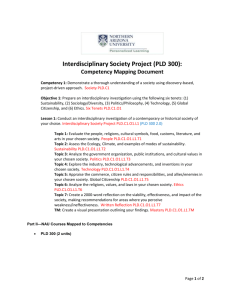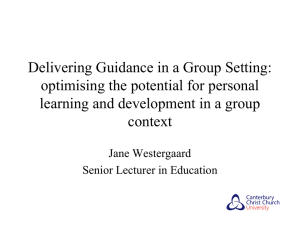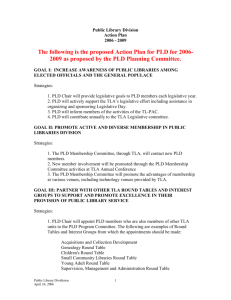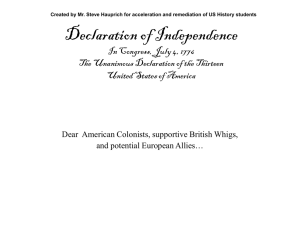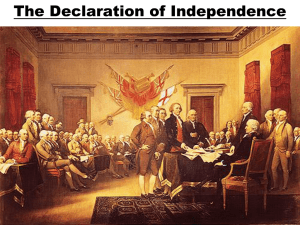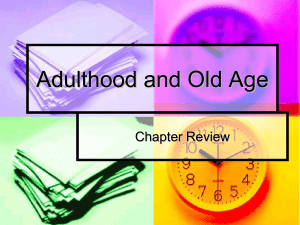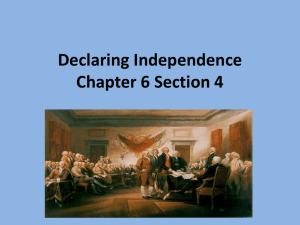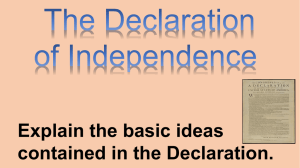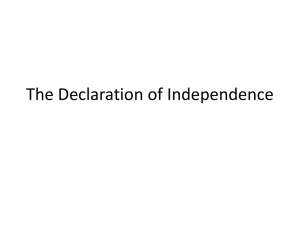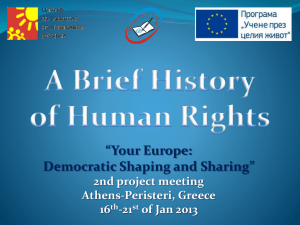Prosecution Evidence
advertisement
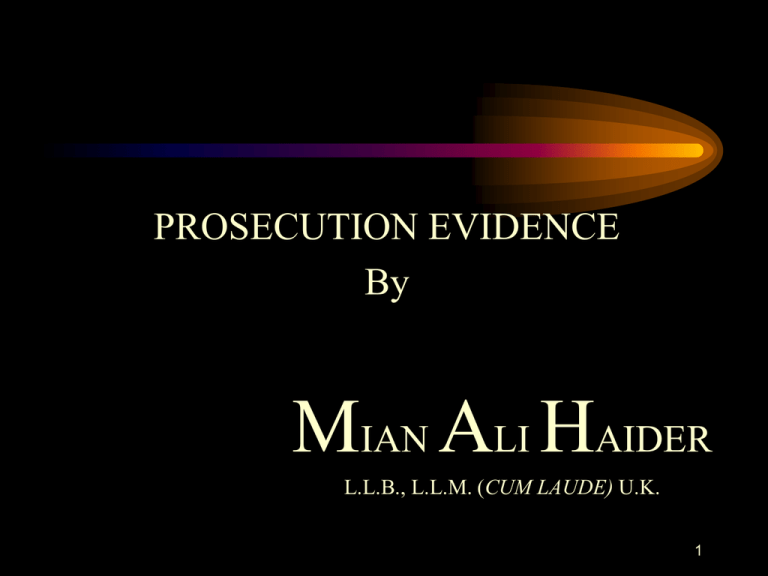
PROSECUTION EVIDENCE By MIAN ALI HAIDER L.L.B., L.L.M. (CUM LAUDE) U.K. 1 SESSION TRAIL • FIR, ITS NATURE AND VALUE AS EVIDENCE IN DIFFERENT CIRCUMSTANCES • OTHER POLICE STATEMENTS • STATEMENTS BY WITNESSES BEFORE MAGISTRATE DURING INVESTIGATION • DYING DECLARATION BEFORE MAGISTRATE, ARTICLE 46 OF 1984 ORDER • RECOVERY EVIDENCE, SECTION 103 CR.P.C. POLICE OFFICIALS AS RECOVERY WITNESSES – 2 INTRODUCTION • All the Evidence in any criminal trial, investigation or inquiry? • Different forms of evidence? • Qanoon – e – Shahdat & Cr. P.C. go side by side? • Different interpretations & applications? 3 1st Starting point of any prosecution evidence • FIR u/s 154 of Cr.P.C. • It’s nature, value as evidential – Supposed to contain the narrative of way incident takes place – Maters of minute detail are not necessary or absence will not vitiate the evidential burden – Person who made the report may not necessarily a party – Such a report is to be regarded as intimation – Which can be made by any one, who gained the knowledge in any manner – Further pursuit of matter by police is the activity of the state (Matlub Hussain’s Case) 4 1st starting point of any prosecution evidence • FIR recorded at spot after investigationtantamount to statement made before police – inadmissible in evidence • If accused report his own crime? – Statement of accused in FIR is not admissible for the reason that it is inculpatory in nature 5 2nd STAGE POLICE STATEMENTS • Statement u/s 161 • Statement made u/s 161 can be contradicted u/s 162 Provided that, when any witness is called for the prosecution in such inquiry or trial whose statement has been reduced into writing as aforesaid, the Court shall on the request of the accused be furnished with a copy thereof, in order that any part of such statement, if duly proved, may be used to contradict such witness in the manner provided by 'section 145 of the Evidence Act. 1872. When any part of such statement is so used, any part thereof may also be used in the reexamination of such witness, but for the purpose only of explaining any matter referred to in his cross-examination. What is the context of section 162 6 2nd STAGE POLICE STATEMENTS • The word “investigation” must refer to investigation of specific allegation of crime • Same crime must have been already reported and therefore the section can only apply to those statements which are steps in furtherance of pending investigation • The mere fact that a statement was made during an investigation is not by itself sufficient to bring it under 162 • Now, the question whether a statement was recorded ‘ in the course of an investigation’ or not is a – QUESTION OF FACT – To be decided on the circumstances of each case 7 2nd STAGE POLICE STATEMENTS • 172. DIARY OF PROCEEDINGS IN INVESTIGATION – Police diaries cannot be used as evidence at all – but can be used by the court – “…Any Criminal Court, may send for the police-diaries of a case under inquiry or trial in such Court, and may use such diaries not as evidence in the case, but to aid it in such inquiry or trial. Neither the accused nor his agents shall be entitled to call for such diaries, nor shall he or they be entitled to see them merely because they are referred to by the Court; but if they are used by the police-officer who made them, to refresh his memory, if the Court uses them for the purpose of contradicting such police-officer the provisions of the Evidence Act, 1872 section 161 section 145 as the case may be, shall apply”. 8 3rd STAGE OF PROSECUTION EVIDENCE • Statements by witnesses before Magistrate during investigation • Section 164 Cr.P.C. read with Section 244A and 265 J Cr.P.C. – Which may include • • • • Confessions Admissions Dying Declaration or Any other statements 9 DYING DECLARATION • “Nemo moriturus praesumitur mentire” • ‘a man will not meet his maker with a lie in his mouth’. • It operates as an exception to the hearsay rule. Hearsay evidence is excluded because it is considered not sufficiently trustworthy. • It is rejected because it lacks the sanction of the tests applied to admissible evidence i.e. the oath and cross examination. • They are not given any importance in the courts because the person who is giving this evidence is not telling his experiences but that of another person and who cannot be cross examined to verify the facts • Law Dealing With it is multifarious 10 Dying Declaration • 46. Cases in which statement of relevant fact by person who is dead or cannot be found, etc., is relevant: (Section 32 of Indian Evidence Act 1872) Statements, written or verbal, of relevant facts made by a person who is dead, or who cannot, be found, or, who has become incapable of giving evidence, or whose attendance can not be procured without an amount of delay or expense which under the circumstances of the case appears to the Court unreasonable, are themselves relevant facts in the following cases: (1) When it relates to cause of death: When the statement is made by a person as to the cause of his death, or as to any of the circumstances of the transaction which resulted in his death, in cases in which the cause of that person's death comes into question. Such statements are relevant whether the person who made them was or was not, at the time when they were made, under expectation of death, and whatever may be the nature of the proceeding in which cause of his death comes into question. 11 Dying Declaration • Two Classic Expressions in same article – “Any of the circumstances of the transaction resulted in his death” – “ The Cause of his death” – (Former is wider than the latter one) – Words “resulted in his death” do not mean “ caused his death” • Law makes admissible not only statement dealing directly with the cause • But also statement as to any of the circumstances – Which may include • cases where cause of dying daclarant's death comes into question • Circumstances in which dying daclarant’s companion may have been done to death in course of same transaction (Muahmmed Aslam & others vs. The State) 12 Dying Declaration • Law relating to recording the dying declaration • Chapter XXV deals with this in detail • If recorded u/s 164 and requirements are not fulfilled , will not affect the admissibility of dying declaration • They are admissible even if made orally • Which contravene the general rule of hearsay evidence • So the article 46 are in no way dependent on, or circumscribed by the requirements as contained in 164 13 Dying Declaration • Credibility ? Reliability? Believability? – Merely a question of “ordinary human judgment” – To accept such statement without considering “surrounding circumstances” • Totally inconsistent with – “Safe dispensation of justice” – But also – Accepting such statement on consideration of opinions expressed in precedents regarding similar declarations, accompanied by words indicating some reliance on “ some principle of law” held to be 14 – “NO LESS DANGERIOUS” Prevailing law and practise on dying declaration • “Once the Court has come to the conclusion that the dying declaration was the truthful version as to the circumstances of the death and the assailants of the victim, there is no question of further corroboration. • If, on the other hand, the Court, after examining the dying declaration in all its aspect, and testing its veracity, has come to the conclusion that it is not reliable by itself, and that it suffers from an infirmity, • then, without corroboration it cannot form the basis of a conviction. • Thus, the necessity for corroboration arises not from any inherent weakness of a dying declaration as a piece of evidence, as held in some of the reported cases, but from the fact that the Court, in a given case, has come to the conclusion that particular dying declaration was not free from the infirmities, referred to above or from such other infirmities as may be disclosed in evidence in that case.” • statement is “WORTHY OF BELIE|F” 15 RECOVERY EVIDENCE (103) • • • • Section applies to search of a place situate in locality not to a search of a person. Section is procedural but mandatory in nature Designed & intend to guard chicanery and concoction. Marked distinction’s – Cases in which compliance of section is made – In cases where no such effort was made • Result of admissibility would be different in both the cases – The offence charged with the recovery of article – The case in which article recovered • Result of admissibility would be different in both the cases – Police officer as an eye witness – Police officer as Investigating officer • Result of admissibility would be different in both the cases 16 (Mushtaq Ahmed Vs. The State) RECOVERY EVIDENCE (103) • When section 103 will not apply? • Exception contained in Article 40? • Reasons – Plain reading of 103 elaborates the scenario where police conducts search of a house / place to recover an article for which search is to be made • But not to – In consequence of the information given by or on the pointation of the accused 17 – Such a recovery is sheltered by Art 40. Reading Material • Muhammad Ashiq – PLD 1957 SC (P) 293; Liaqat Ali – 1981 SCMR 1130; Nasim Akhtar – PLD 1968 Lah. 841; Muhammad Hanif – PLD 1977 Lah. 1253; Lakhmir – PLD 1968 Q 7; Ghulam Qadir – PLD 1967 Pesh. 269 A.Nagesia – AIR 1966 SC 119; Khalil Ahmed – 1975 SCMR 442; Ismail – 1976 SCMR 135 ; Hamid Khan – PLJ 1980 SC 519; Muhammad Saleh – PLD 1965 SC 366; A.Nagesia – AIR 1966 SC 119; Against others ; Ghandal – PLD 1960 SC 137; Salman Shah – PLD 1971 SC 751; Muhammad Aslam – PLD 1978 SC 298 ; Reg v Osman (1881) 15 Cox CC 1, 3; Zarif – PLD 1977 SC 612, 617 (modern approach) Ratten (1971) All ER 801; Bakhsheesh Singh – AIR 1925 Lah. 549 ; Abdul Razik – PLD 1965 SC 151; Tawab Khan – PLD 1970 SC 13; Muhammad Aslam – PLD 1978 SC 298 Ratten – (1979) 3 All ER 801; Mushtaq Ahmed – PLD 1996 SC 574; Mir Ahmed – 1995 SCMR 614 ; Javed Masih – PLD 1994 SC 314, 324; Mir Ahmed – 1995 SCMR 614 18
